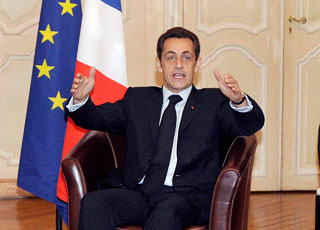
By The Independent Reporter
FRANCE
French President Nicolas Sarkozy, holder of the European Union’s rotating presidency, and British Prime Minister Gordon Brown are pushing for reforms to the world’s financial architecture and leading on European measures to stabilize banks and restore confidence to markets. But France’s foreign minister, Bernard Kouchner, said big decisions on regulating world markets will await President-elect Barack Obama.
The energetic and often impatient Sarkozy says the U.S. dollar should no longer be seen as “the only global currency”as it has since World War II. Using the euro currency, European governments agreed to guarantee new bank debt and rescue large failing banks through emergency recapitalization. They want five principles agreed immediately: submit ratings agencies to more surveillance; align accounting standards; close loopholes; regulate banks to reduce excessive risk-taking; and ask the International Monetary Fund to suggest ways of calming the turmoil.
By Emma Vandore in Paris
BRITAIN

Gordon Brown’s agenda includes coordination on fiscal stimulus packages, a cleanup of the banking system, a beefed up surveillance role for the IMF, demands for banks to pass on interest rate cuts to customers, and a new push for a world trade deal.
He’s likely already won assurances from the Persian Gulf region to help fund a vast increase of the IMF’s $250 billion bailout pot for struggling economies and will pressure China to follow suit.
Brown also seeks a new network of global regulators who would scrutinize the world’s largest financial institutions.
By David Stringer in London
GERMANY

German Chancellor Angela Merkel says there can be ‘no more blind spots’ in international markets. Merkel argues that the IMF Fund should get greater powers to oversee financial companies that are active globally.
She also backs revised rules for rating agencies and an effort to make it harder for companies to hide risks outside their balance sheets.
By Matt Moore in Berlin
USA

President George W. Bush says the free market is the best answer to the world’s economic crisis, preemptively warning foreign leaders not to crush global growth with the weight of intrusive oversight.
‘We must recognize that government intervention is not a cure-all,’ Bush says. He acknowledged that governments and independent regulators have failed consumers. His prescription: tougher accounting rules and more modern international financial institutions.
By Ben Feller in Washington
ITALY

Premier Silvio Berlusconi wants measures to ensure that banks continue making loans, especially to businesses and the banks that have received state aid. He also favors a mechanism to prevent an excessive drop in a company’s stock price, leaving the company undervalued. Berlusconi described the mechanism as ‘an authority that would call a halt to trading when the finance world divorces itself from the real world.’
Italy also is calling for more stringent controls on the financial sector, including the introduction of common norms.
By Colleen Barry in Rome
JAPAN

Prime Minister Taro Aso has a fiscal stimulus package and is reassuring global leaders that Japan’s financial system is healthy. Aso’s 27-trillion-yen ($275.7 billion) economic stimulus package unveiled in late October includes expanded credits for small businesses and 2 trillion yen ($20.4 billion) for cash disbursements to households. The Japanese banking sector is flush with cash and Japan is prepared to lend up to $100 billion to the IMF to support countries reeling from the global financial crisis.
By Tomoko Hosaka in Tokyo
CHINA

China says it represents the interests of developing countries and wants a bigger role in global financial bodies such as the IMF.
China has been trying to lower Western expectations that it will join in global actions, stressing its domestic economic problems and limited resources as a developing country.
Premier Wen Jiabao and other officials say Beijing’s $586 billion stimulus package for its economy, the world’s fourth-largest, is the biggest contribution it can make to help assure global stability.
_ By Joe McDonald in Beijing
RUSSIA

Russia has called for reforming the global financial regulatory system, saying the IMF has failed in its role as a crisis manager. The Kremlin wants both IMF reform and the creation of alternative lenders of last resort for countries in crisis, and says it is willing to contribute to the cost of the new agencies.
Finance Minister Alexei Kudrin called for a new agreement along the lines of the Maastricht Treaty, which created the euro, that would obligate every nation to meet a certain set of budget and economic criteria in order to prevent new crises.
The Kremlin has dismissed as inadequate recent changes to give Russia and China, two of the world’s largest emerging economies, a bigger say in IMF policies.
By Nataliya Vasilyeva in Moscow
SPAIN
Prime Minister Jose Luis Rodriguez Zapatero holds up the Spanish banking industry as a model for other countries whose banks have gone under in the crisis. No Spanish banks have collapsed or required rescue of late but they have been hit by the credit crunch.
The Socialist government has made 150 billion euros ($192.4 billion) available for buying high-quality assets from banks and underwriting bank loans to get credit flowing again to businesses and consumers.
By Daniel Woolls in Madrid
SOUTH AFRICA

Christopher Hart, Johannesburg-based chief economist at Investment Solutions, an international investment management company that specialises in South Africa, said he expects South Africa to stress that developing nations have suffered as a result of the financial crisis in the developed world. He says Africans are particularly concerned about protectionism.
By Donna Bryson in Johannesburg
BRAZIL
Brazilian President Luiz Inacio Lula da Silva is insisting that big developing nations like Brazil must have a major role in drawing up new regulations for international finance, contending that rich nations set up the old system but failed to foresee or prevent the current crisis.
Silva also says the IMF and the World Bank must have their voting structure changed to give large developing nations more of a voice in decisions.
_ By Alan Clendening in Sao Paulo.
MEXICO

Mexican President Felipe Calderon is pushing for a globally coordinated response to the financial meltdown that would include stricter government regulation, more supervision of markets, greater transparency, and stimulus packages adopted by countries simultaneously. At the same time, Calderon has made clear that market dynamics must be preserved.
Mexico also wants the IMF to be strengthened and has lobbied for the expansion of the Financial Stability Forum, founded in 1999 by the Group of Seven leading industrialised countries to bolster the international financial system.
– By Julie Watson in Mexico City
ARGENTINA
Argentine President Cristina Fernandez is advocating ‘structural changes’ in financial institutions such as the IMF and the World Bank. Argentina has asked the IMF for short-term ‘loans without any strings attached’ to soften the effects of the global crisis.
Argentina also supports Brazil’s bid for more representation for emerging economies in international financial institutions. By Mayra Pertossi in Buenos Aires
TURKEY
Turkey’s Prime Minister, Recep Tayyip Erdogan, opposes a new standby deal with the IMF despite calls from businessmen, academics and market players. Erdogan says such a deal is not necessary and Turkey will not accept harsh conditions. Turkey has been holding talks with the IMF for a potential precautionary standby loan to partly address market worries. But the government is reluctant to sign a new deal and claims the economy was sound despite the global economic crisis.
By Selcan Hacaoglu in Ankara
Associated Press Report
| How not to solve the global financial crisis
A new report from a global group of think-tanks argues that the attempts by governments to intervene in the financial crisis have been counterproductive and it calls for clearer thinking on how to manage the risks inherent in the financial system. The report entitled: “How not to solve a crisis” notes that: “Governments are terrible at allocating resources and their attempts to boost our economies will almost certainly backfire. Economic growth is the result of entrepreneurs identifying and filling niches by developing better products and production processes, thereby boosting production and productivity. In contrast, when governments throw money at the economy, they divert resources away from their most efficient and effective uses, undermining innovation and growth.” It concludes that: “The best way to stimulate the economies of the world would be to reduce the number of overbearing taxes and regulations that currently inhibit the development and delivery of all manner of products and services.” —The report recommends that as governments contemplate new policies to address the turmoil in financial markets, they should note that: —Better mechanisms are needed to manage the failure of large financial institutions, some of which may now be both too big to fail and also too big to rescue. —Open ended guarantees to depositors and other counterparties are expensive and unsustainable in the longer term. —The rights and hierarchy of investors across the capital structure should be clear and honoured ” not subject to arbitrary alteration by government. —Closer attention to the rights of collateral providers and custodians in the case of failures can limit systemic risks. —Hedge fund failures have not created systemic risks in this crisis and they should not be a target of policy action. —Ad-hoc bailouts should be avoided, since they create ever expanding demands for further intervention. —Much more thought needs to be given to the unintended consequences of over strict capital rules, rating agency privileges and rating based limits on pension investments. |
 The Independent Uganda: You get the Truth we Pay the Price
The Independent Uganda: You get the Truth we Pay the Price



